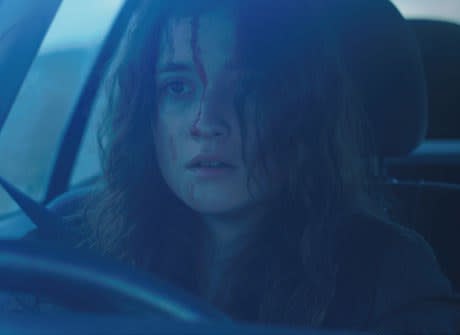In essence, a home invasion thriller without an actual home, Jeremy Lovering's feature directorial debut, In Fear, confines the majority of its action to a car. Looking for a hotel he rented online, Tom (Iain De Caestecker) takes his new pseudo-girlfriend Lucy (Alice Englert) off the beaten path, beyond a chained fence and narrow roadways, ignoring an abundance of peculiar roadblocks, being preoccupied with the outcome of what will occur at the end destination.
Lucy is slightly more practical and intuitive about the situation, realizing that the maze they've driven into is an unlikely reality for a functioning hotel operating a legitimate business.
Initially, this gender-based conflict and duality propels the narrative, with Lucy retreating into preservation mode while Tom forges ahead on his single-minded mission, certain that there's a logical outcome or end destination just ahead. And as peculiar events compound, such as hotel signs moving and items being shifted in and outside of the car, the nascent couple slowly turn on each other, arguing their respective stance and speculating about a perceived conflict at a local pub that might have antagonized someone enough to follow and harass them.
What Lovering excels at is building up an unnerving sense of dread and suspense. As Tom and Lucy gradually devolve into a panic mode, the minor peculiarities and quick glimpses of possible people running around the trails deliver the requisite scares, imposing anxiety and distress onto the audience. But because Lovering is more concerned with examining the nature of evil, and its existence within every individual, the choices and logic demonstrated by the two characters, especially when confronted with a mysterious stranger, make very little sense.
While the psychological aspect of In Fear builds integrity, forcing Lucy into a situation where she has to choose between herself and Tom, and challenging Tom with taking responsibility for his actions or going through with his verbal assertions, their decision making is questionable. Because there are many opportunities for them to get away, or read the weirdness of a situation and resultantly take action, the scares are eventually replaced with frustration.
Still, the morality play at hand is far more thought-provoking and astute than the horror genre usually allows, questioning if evil is something punishable by karma, or if sheer selfishness and lack of compassion for others is in itself just as harmful as psychological manipulation or violent acts.
With a little more cohesion between scare tactics, subtext and actual character motivation, In Fear could have been a taut, memorable, suspenseful horror film in the vein of Ils. But as it stands, it's a mostly effective, but inherently flawed, text showcasing the acting talents of Alice Englert and the directorial possibilities of Jeremy Lovering.
(Big Talk Productions)Lucy is slightly more practical and intuitive about the situation, realizing that the maze they've driven into is an unlikely reality for a functioning hotel operating a legitimate business.
Initially, this gender-based conflict and duality propels the narrative, with Lucy retreating into preservation mode while Tom forges ahead on his single-minded mission, certain that there's a logical outcome or end destination just ahead. And as peculiar events compound, such as hotel signs moving and items being shifted in and outside of the car, the nascent couple slowly turn on each other, arguing their respective stance and speculating about a perceived conflict at a local pub that might have antagonized someone enough to follow and harass them.
What Lovering excels at is building up an unnerving sense of dread and suspense. As Tom and Lucy gradually devolve into a panic mode, the minor peculiarities and quick glimpses of possible people running around the trails deliver the requisite scares, imposing anxiety and distress onto the audience. But because Lovering is more concerned with examining the nature of evil, and its existence within every individual, the choices and logic demonstrated by the two characters, especially when confronted with a mysterious stranger, make very little sense.
While the psychological aspect of In Fear builds integrity, forcing Lucy into a situation where she has to choose between herself and Tom, and challenging Tom with taking responsibility for his actions or going through with his verbal assertions, their decision making is questionable. Because there are many opportunities for them to get away, or read the weirdness of a situation and resultantly take action, the scares are eventually replaced with frustration.
Still, the morality play at hand is far more thought-provoking and astute than the horror genre usually allows, questioning if evil is something punishable by karma, or if sheer selfishness and lack of compassion for others is in itself just as harmful as psychological manipulation or violent acts.
With a little more cohesion between scare tactics, subtext and actual character motivation, In Fear could have been a taut, memorable, suspenseful horror film in the vein of Ils. But as it stands, it's a mostly effective, but inherently flawed, text showcasing the acting talents of Alice Englert and the directorial possibilities of Jeremy Lovering.




